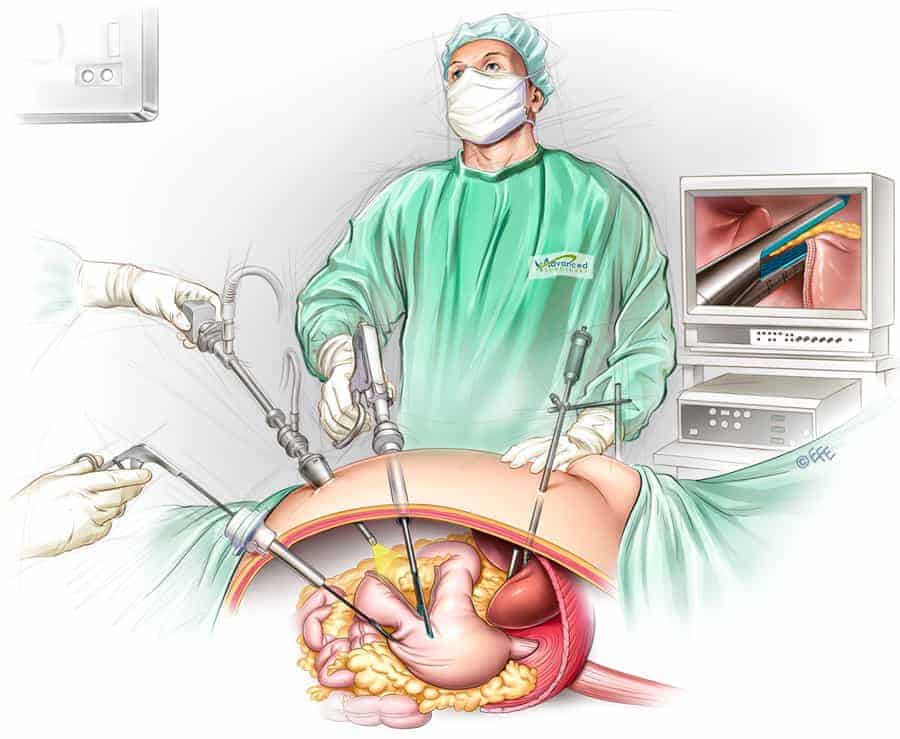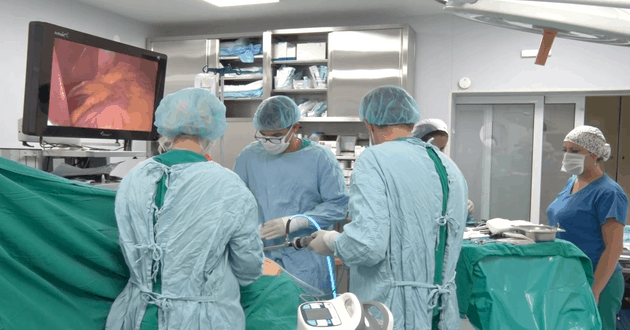Obesity has become a global problem. In the last 30 years, various sweeteners have started to be used in the food industry, fats have been eliminated from food because fat-free diets have become popular, and sugars have been added as flavor enhancers. The obesity epidemic has seriously affected the world’s population. Obese people have a large excess of body weight and, as a rule, have been on diets all their lives. Assistant Professor Dr. Dejan Veličković deals with esophageal and gastric surgery. He learned bariatric surgery from world-renowned experts in Lithuania, the United States and Romania. He has been applying the acquired knowledge in Serbia for eight years and successfully helps obese patients who are ready to change their lives and be treated on time.
Who is a good candidate for gastric Sleeve surgery?
Doc. Dr. Dejan Veličković: “ Our criteria for a patient to be a candidate for Sleeve surgery and the criteria for bariatric surgery in other major world centers that deal with bariatric surgery is the body mass index over 40. So, these are people who struggle with weight all their lives and mostly have been obese since childhood. This problem accumulates and then the patients reach the stage when there is no going back. Patients with the problem of obesity get various diseases related to obesity. The most common are hypertension, diabetes, problems with the bone and joint system, spine pain, pain in the hips, knees, ankles and similar. For obese people, surgery is the last option to save lives. ”

How much weight can be lost if the prescribed postoperative regime is followed?
Doc. Dr. Dejan Veličković: “ At Atlas Hospital, we perform two types of procedures. We perform Sleeve gastrectomy where the stomach is narrowed to a diameter of about 2 cm, which means almost equal to the width of the esophagus. The capacity of the stomach to take food is significantly reduced, and with that operation you can lose quite a lot – fifty, sixty kilograms. We had patients who lost weight much more. The most intensive weight loss is in the first year, and if the operation is performed technically correct, the effects can be long-lasting.
The second operation we perform is gastric bypass. It is a combination of restriction, reduction of stomach capacity and exclusion of one part of the small intestine from the passage, which means resorption. A combination of resorptive and small absorptive procedures. This operation is more radical in relation to Sleeve gastrectomy and is mainly used as the primary choice for patients who have severe diabetes. “

What are the non-surgical methods for weight loss?
Doc. Dr. Dejan Veličković: “Patients are almost always afraid of surgery. We perform treatment with different methods, less invasive – endoscopic methods. We place an intragastric balloon in the stomach, which significantly reduces the capacity of the stomach. The intragastric balloon has a certain hormonal effect and prolongs the feeling of satiety. This intervention is mostly an option for patients who do not have such a large excess body weight. For patients with a body mass index over 40, the balloon can only be an introduction to surgical treatment of obesity. For patients with a body mass index of 35 to 40 and a balloon, it can be a permanent solution.

Gastric Sleeve surgery preparation
Doc. Dr. Dejan Veličković: “ All patients, who are planned for bariatric surgery and for whom we set an indication, undergo examinations by specialist doctors:
- Anesthesiologist
- Cardiologist
- Endocrinologist
- Pulmonologist
- Pneumophthisiologist
We all need to make sure that the patient is able to have surgery, even though it is a relatively simple surgical procedure. These patients are quite serious about administering anesthesia and the postoperative course. Most people come to the operation thinking that they are just obese, not realizing that they are very sick. We often need a consultation with a psychiatrist. Almost always, when we schedule surgeries for patients, we try to put them to the test to see if they are mentally ready to lose weight, which also makes the operation technically easier for us. We put patients on a low-calorie diet before the operation, so patients must also show commitment to losing weight. ”
Surgical and non-surgical methods performed at the Atlas hospital bariatric surgery center
Doc. Dr. Dejan Veličković: “ Patients do not have any large incisions in the abdomen. There are only small incisions through which instruments and cameras are inserted, through which we see and can work inside the stomach. The operation consists in narrowing or shortening the stomach and removing a large part of it. This significantly reduces the capacity of the stomach. The operation lasts between an hour and a half to two hours. The operation is performed laparoscopically, without incisions, and patients wake up after the operation. Already during the evening, a few hours after the operation, in cooperation with physiatrists and physiotherapists, patients will be prepared to stand up, they start taking fluids. One day or possible two days after the operation, the patients are ready to go home. When the operation is performed technically well, the patients the next day look as if they have not been operated and they tolerate this intervention better than gallbladder surgery, which is unbelievable for all of us. ”
The patient is monitored continuously because the problem is complex and all aspects must be considered.
Doc. Dr. Dejan Veličković: “ Ten days after the operation, we remove the sutures. All patients receive a pre-written diet or plan on how to eat in the coming months. The liquid and porridge diet is slowly introduced first, and later they switch to solid food. Of course, we monitor patients by phone, and they come for check-ups every three or six months until they are completely satisfied. ”

What do patients encounter after Sleeve gastrectomy?
Doc. Dr. Dejan Veličković: “Immediately after the operation (Sleeve gastrectomy), patients encounter a new reality. They cannot eat as much as they are able to, which causes frustration for many patients. It has been shown that after this operation and gastro bypass surgery, patients must take supplementation with microelements, minerals and proteins for life time. ”
If surgery is not performed – Sleeve gastrectomy, obesity can lead to very dangerous and severe cardiovascular diseases, heart attacks, joint diseases, severe forms of diabetes.
Dr. Veličković has operated very young obese people in his career, but he explains to patients that somewhere around the age of forty would be the last chance to stop obesity. Patient should struggle to lose tens of kilograms and prevent further collapse of health.
You can watch the whole article HERE.
